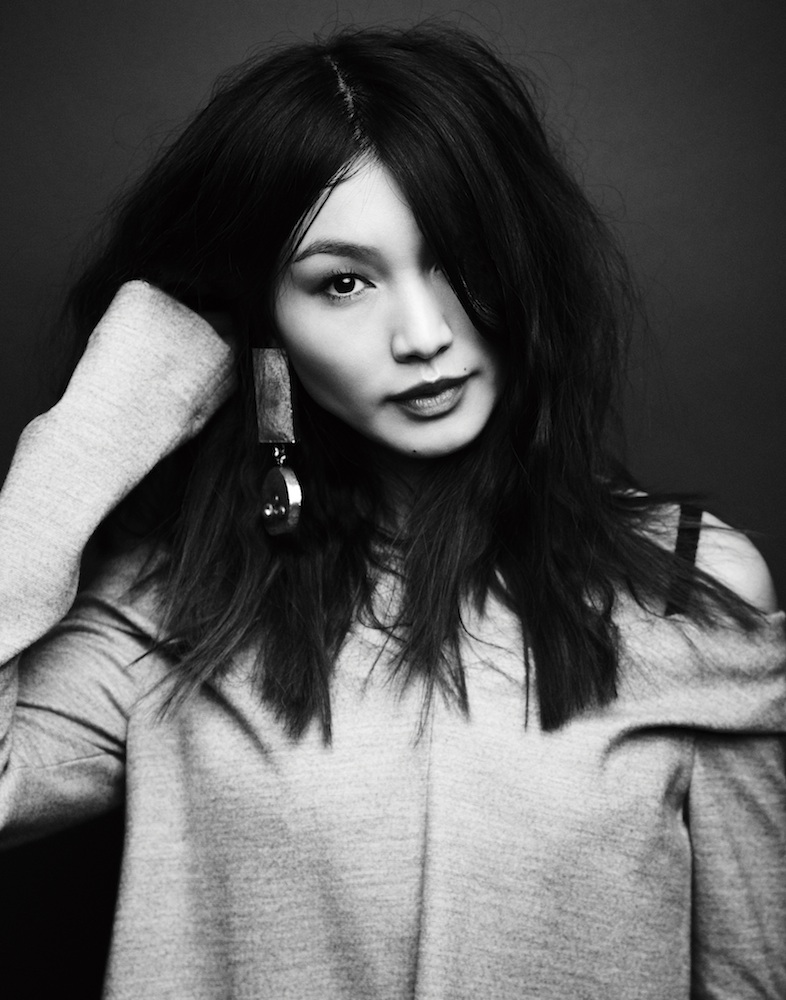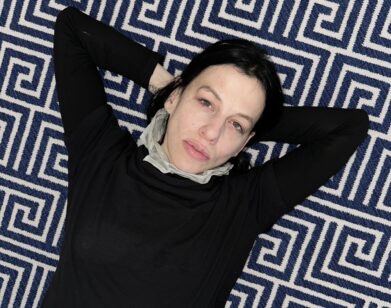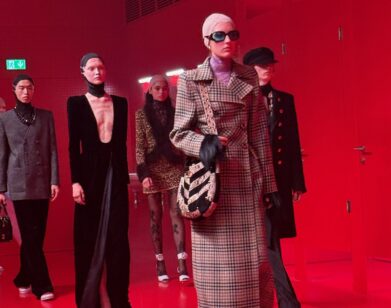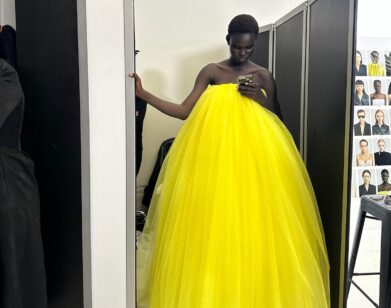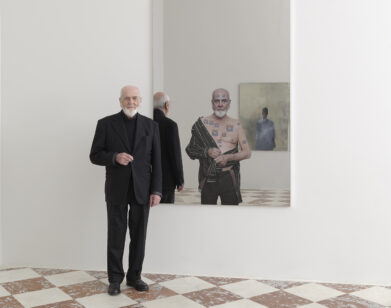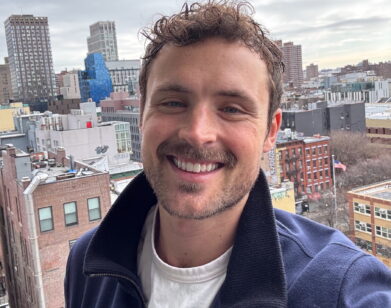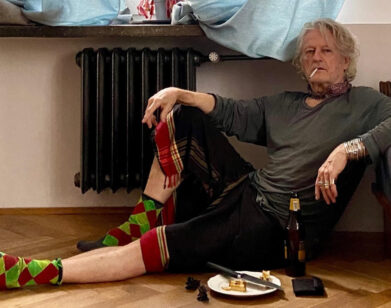Gemma Chan and Human Values
ABOVE: GEMMA CHAN IN LONDON, JUNE 2015. PHOTOS: MATT HOLYOAK/KAYTE ELLIS AGENCY. STYLING: VALENTINE FILLOL-CORDIER. HAIR: JOHN MULLAN FOR THE LONDON STYLE AGENCY. MAKEUP: AKGUN MANISALI FOR THE LONDON STYLE AGENCY.
Anita, one of the protagonists of AMC’s new drama Humans, is a synth: a robot in an alternate present day designed to takeover household chores and make life a little bit easier for humans. Her eyes glow an unnatural shade of turquoise; when she bleeds, she oozes blue fluid. Her movements are seamless, but a little too deliberate. Her voice is soothing and unaccented. When you tell her a joke, she’ll politely respond with the same phrase: “I’m afraid I don’t understand the question.” But, beyond her appearance, there might be something a little human about Anita. She gets lost in thought (processing?) staring at the moon. When she gives her pat answer, it can feel like a defense mechanism.
“A big part of the show [is] asking what is it that makes us humans,” says British actress Gemma Chan, who plays Anita. “Synths are attending to jobs that we don’t really want to do anymore,” she continues. “I think it raises some really interesting ideas about how we treat people we consider less than us…as a society, we seem to value certain people less than others.”
Based on a Swedish television series, Humans debuted over the weekend and co-stars William Hurt, Colin Morgan, and Katherine Parkinson. Next up, Chan, who was raised in Kent and educated at Oxford University, will appear alongside Johnny Depp and Amber Heard in London Fields, an adaptation of Martin Amis’ novel of the same name.
EMMA BROWN: How did you first hear about Humans?
CHAN: I saw a news article saying that the rights to the version of the Swedish show had been bought by a British production company. Quite unusually for me, I sent that to my agent and just said, “I have a feeling about this show. If they ever cast for it, I would love to be involved in some way.” I didn’t hear anything, and then six months later, I got the call to go in and audition. I did one audition and that’s it, I got the part. Before my audition, I saw the three-minute trailer of the original show. Once I got cast I didn’t want to watch any of the original show because I didn’t want to be influenced by it in any way. I think it’s quite different. It’s the same premise—highly advanced A.I. living amongst humans—but I would say the tone is quite different. Our show is maybe a little bit darker and the synths in our show are a little bit more real than they look and sound in the Swedish show. Not all the characters are the same. Some characters in the show are amalgamations of several other characters in the Swedish show. From quite early on in our show, the plot goes on in a different direction, which I think is good. I love watching Scandinavian dramas and there is no point in doing a carbon copy remake of something. Lars Lundstrom, the creator of the original, loves our show.
BROWN: Did you audition specifically for Anita?
CHAN: I did audition for Anita, although I didn’t know what part I was called in for. I would have happily played a human.
BROWN: I know that when you were cast, you went through synth training. Before the training, did you have your own idea of how to act like a synth?
CHAN: It was a really collaborative process. We worked with a brilliant choreographer called Dan O’Neill—he is the movement director of Frantic Assembly, a really amazing dance company in London. We worked with him for about a month before we started shooting. It started with just a core group of us, but later on anyone who was an extra playing a synth had to go through at least a day or two of synth schools—like The Walking Dead zombie school. We were all on the same page. Our director was very involved and the writers came to watch the workshops as well. We tried out so many different things and we gradually came to a consensus of this is what the universal traits are going to be. Then we did lots of individual work with Dan to make it specific to each of our characters because various synths are [different models]. There’s a really old original [model], who is slightly malfunctioning. Anita, my character, is the newest, top-of-the-range [model], so her movements are even more smooth. It’s definitely not the kind of job you can turn up on day one having done no workshopping. You just wouldn’t know where to start.
BROWN: Is it hard not to over intellectualize everything you’re doing as a synth?
CHAN: Particularly at the beginning, I thought my head was going to explode. I remember coming home after the first day of filming and I thought, “Oh my god. I don’t know how I am going to do this for six months.” As well as all the physical stuff you have to remember, you have to adapt to the scene you are doing. I’d often, when I’m in the house, have to be doing a task whilst I am playing a scene, like loading the dishwasher or doing the laundry. That has to be done in such a precise, specific way as synth. Most of your brain is taken up with all this technical information, like only five steps to the door because you can’t take any half-steps or shuffles because a synth would know exactly the distance. You are trying to play the scene with the actor and also play a synth that is showing little traits of being human. But I loved it.
BROWN: Was there someone on set to let you know when you seemed too human?
CHAN: Luckily Dan was on set everyday watching the monitor. He would come up and whisper, “Your ass is sticking out.” He had to correct my posture quite a lot. Or apparently I have an overactive left arm—I swing my left arm more than my right arm—so he would always correct me.
BROWN: Has playing a synth made your more still in your personal life?
CHAN: No, I think my body has rebelled since we finished filming. Every day I would come home and sprawl on the couch and be a complete slob.
BROWN: I know you studied law at university. Did you always secretly want to be an actor?
CHAN: I haven’t always wanted to be an actor, no. I wasn’t one of the little kids that was desperate to be an actor. I did a lot of drama and a lot of music, but it was just something for fun on the side. I was quite shy as a kid and I found a lot of freedom in performing. I never knew you could do it as a job. It never crossed my mind until I had gone to university. I loved the experience of being at university, but I knew quite early on that I didn’t want to practice law as a job. Then I auditioned for drama school in secret.
BROWN: What gave you the courage to audition for drama school?
CHAN: If you find something you are passionate about, you’ve got to try. Even if something doesn’t quite work out, disappointment is a temporary thing. Regret lasts forever.
BROWN: If you hadn’t gotten into drama school, would you have worked at a law firm? Did you have a backup plan?
CHAN: I didn’t. I turned down a job with a law firm and I only applied to only one drama school. I really wanted to go to Drama Centre because I heard it was the toughest. I don’t know what I would have done if I hadn’t got in. I wouldn’t have given up completely. I’m sure I was terrible; I did a terrible audition.
BROWN: What did you do for your audition?
CHAN: I chose pretty bad, inappropriate things. I thought, “I am going to do a really, really dark monologue.” I think I did a monologue from The Censor [by Anthony Neilson] and it was just completely wrong for me. I had started to go to some evening classes in the run up to my audition, but mostly I did it on my own. I don’t want to blame how bad I was on anybody else.
BROWN: Did you do drama for A-Levels?
CHAN: No. I did science. At one point I wanted to work for NASA and be an astrophysicist, so I did physics, math, and chemistry before realizing I probably wasn’t quite smart enough to do that. But I am still hugely interested in cosmology and astrophysics. That is my geeky subject area. I once met Professor Brian Cox. He is literally a rock star physicist. I was completely star-struck. I didn’t know what to say and I was completely embarrassed, which I don’t get around other actors. I was very awkward. And [astrophysicist] Neil DeGrasse Tyson, he is incredible as well. I follow him on Twitter.
BROWN: So Johnny Depp doesn’t unnerve you, just physicists?
CHAN: Johnny was amazing. He was so lovely and chilled actually. He makes everyone around him feel relaxed. I was not as fazed by him as I was by Professor Brian Cox.
SEASON ONE OF HUMANS AIRS SUNDAYS ON AMC.

